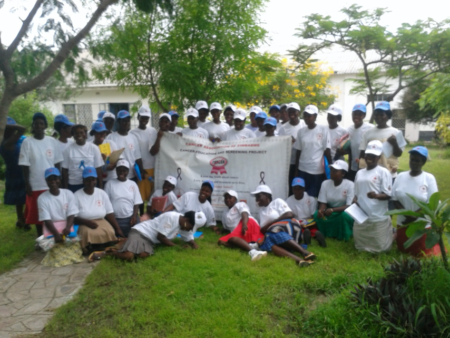 (Picture) Rural Female Volunteers in Mudzi District, Zimbabwe-Cancer Association of Zimbabwe
(Picture) Rural Female Volunteers in Mudzi District, Zimbabwe-Cancer Association of Zimbabwe
Breast cancer is a growing problem in low-resource settings. A report by the International Agency for Research on Cancer, GLOBACOB revealed that an estimated 94,378 new cases of breast cancer are diagnosed in sub-Saharan Africa annually, with incidence rates varying between African countries.
In a bid to empower women to take charge of their bodies and health, the African Women’s Development Fund (AWDF), provides resources to women’s organisations and groups under its ‘Body and Health Rights’ thematic area. These organisations and employ innovative strategies to help improve behaviour in symptomatic women in seeking health-care and referral. They also empower women with skills to undertake self-examination for early detection of lumps in the breast.
Since inception, AWDF has invested over $300,000 in grants and capacity support to about 10 breast cancer related organisations on the African continent. These are national and community based organisations who are well grounded in issues of breast cancer prevention and support programming. The organisations undertake activities such as breast cancer education, free breast screening campaigns in institutions and communities, education, counselling and support for women diagnosed with breast cancer as well as providing hospice services to patients with breast cancer related problems. The women’s rights organisations also empower the health sectors within the various countries by training health care workers to educate and provide gender-friendly health care services at the grassroot level. The initiatives of such women’s organisations and groups have had a great impact on health seeking behaviours of women, patients and breast cancer survivors.
“The education, interaction, free screening project and the usual hospital visitations have created an avenue for support and bonding with patients, and this has led to the reduction of anxiety and the feeling of isolation. The sharing of experiences by survivors who are volunteers helped the patients to relate to their journeys in the knowledge that there is life and hope after breast cancer”, says Mrs. Gladys Boateng, Reach for Recovery-Ghana.
“Continuous visits to survivors aside from offering peer support also helped families of patients better relate to what is happening to their loved ones and in turn served as a source of hope, comfort and relief to both the patients and their families,” Cancer Association of Zimbabwe.
The organisations also engage strategic health sector stakeholders as well as sector policies to advocate for friendly policies on diagnosis and the availability of appropriate treatment; sustainable pathological resources; palliative care for patients with late-stage breast cancer as well as reduced financial burden for average patient with breast cancer in sub-Saharan Africa. Such strategies are known to improve early diagnosis.
As we celebrate the breast cancer month, AWDF is lending its voice to the cause to reiterate the urgency of investing more in women’s body and health rights to ensure autonomy over their lives in general.
In solidarity with all women and survivors, together we can surmount!
